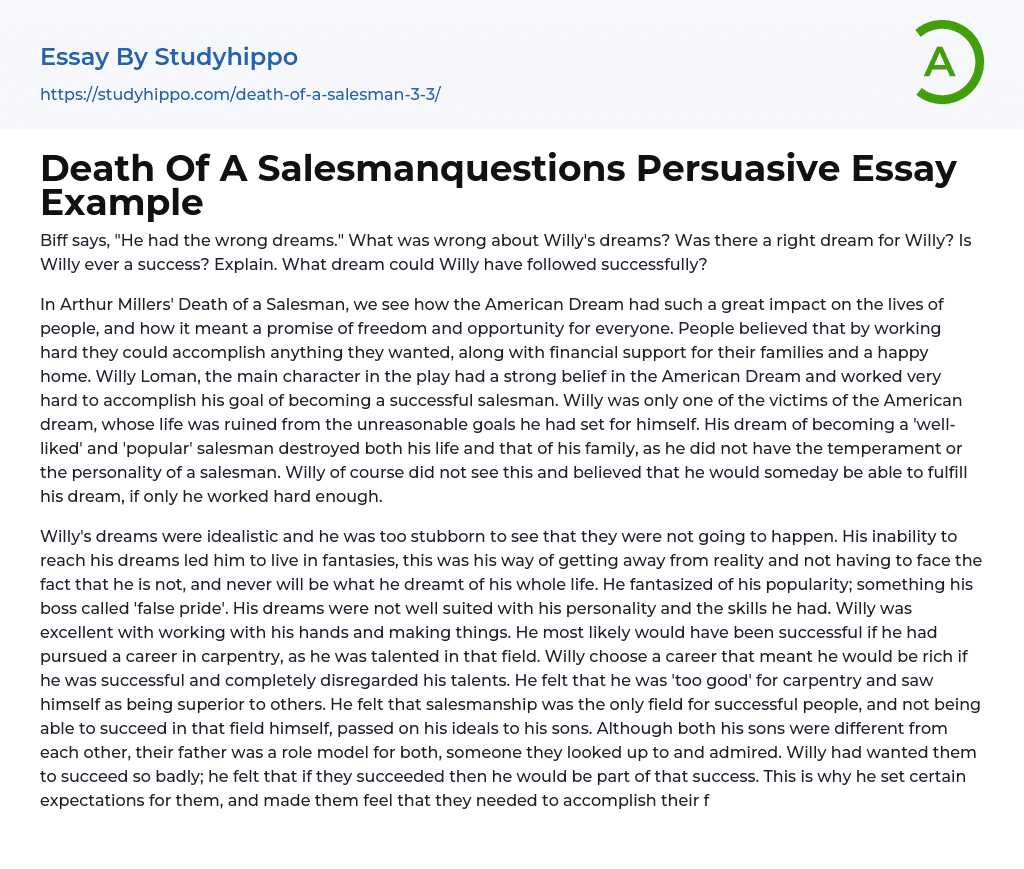Biff questions the validity of Willy's dreams and it is unclear what exactly was problematic about them. It is also uncertain if there was a particular dream that would have been right for Willy or if he ever attains success. Arthur Miller's Death of a Salesman delves into the impact of the American Dream on individuals' lives. The American Dream offered freedom and opportunities to everyone, who believed that by working hard they could achieve their aspirations, support their families, and find happiness at home.
Despite Willy Loman's dedication to the American Dream and relentless pursuit of success as a salesman, his unrealistic ambitions ultimately led to the destruction of both his own life and that of his family. His obsession with being popular and well-liked hindered not only his own happiness but also impaired his ability to effectively perform in his job. Nevertheless,
...Willy remained oblivious to these faults and firmly held onto the belief that hard work alone would eventually bring him closer to achieving his dreams.
Willy stubbornly held onto his unrealistic dreams, unaware of their unattainability. Instead of accepting his limitations, he chose to escape reality through fantasies. These fantasies helped him avoid facing the truth that his lifelong aspirations would never be achieved. One specific fantasy involved being popular, but his boss dismissed it as mere 'false pride'. Willy's dreams did not match his personality or abilities.
Willy displayed excellent aptitude in manual work and craftsmanship, which could have led to a successful career in carpentry. However, he decided to pursue a more lucrative profession, disregarding his inherent talents. Willy held the belief that carpentry was beneath him and considered himself superior t
others. He strongly believed that true success could only be achieved through salesmanship and passed on this mindset to his sons.
Regardless of their disparities, both of his sons held their father in high regard and saw him as a source of inspiration. The father harbored a strong aspiration for his sons to prosper, convinced that their accomplishments would be a testament to his own success. In order to accomplish this, he established certain standards for them, instilling within them the importance of meeting his own ideals. Biff, who was favored by his father, enjoyed a close and affectionate bond with him until he came back home and observed the tragic decline of his role model.
Discovering his father's affair and the lies he had been told shattered his perception of his father as a flawless figure, leaving him feeling deceived and cheated throughout his life. This harsh truth devastated him, prompting a desire to redefine his own aspirations in pursuit of genuine happiness.
Biff realized that his father's failure revealed the fallacy of the American Dream, showing that hard work alone does not guarantee success. To succeed as a salesman, one must possess technique, skill, and the ability to captivate potential customers. Additionally, building strong relationships and mastering the art of selling are crucial for effectively promoting a product.
Willy believed that achieving success goes beyond mere motivation and hard work. He attributed his and his sons' discontent with their accomplishments to having misguided dreams. Regardless of his talents as a carpenter and the love he received from his family, Willy always yearned for more. However, these factors were not enough to bring him solace when he experienced
failure in sales. According to Willy, if one could not thrive in business, their life held no meaning.
When Charley offered him a job, Willy declined, believing that he was 'too good' for it. This mindset of considering himself superior to almost everyone and everything resulted in the breakdown of his relationships with others, potentially contributing to his declining customer base over time. Additionally, this inflated self-image ultimately led him down the wrong career path, causing his own downfall. If Willy had been content with being a carpenter, he could have achieved success and attained enough financial stability to support himself and his family. Furthermore, he would have likely enjoyed happiness and formed friendships. However, his excessive pride caused him to reject people's attempts at friendship and isolate himself instead.
Personally, I cannot claim that Willy was ever successful. His ideals were misguided, and he perpetuated them by imparting them to his sons. Furthermore, he treated his wife poorly, as well as his friend Charley. He had an expectation that everyone should share his views, and if they didn't, he branded them as failures. Regrettably, he failed in holding onto a job, instilling proper values in his children, fostering relationships, and demonstrating fidelity and honesty towards those around him.
The American Dream that Willy pursued ultimately caused his downfall and resulted in various negative consequences. The only action I believe Willy took correctly was ending his own life. Despite the harshness of this statement, it was the sole means of freeing those around him from his unrealistic aspirations. His death allowed them to pursue their own desires without his interference.
It served as a means for him to take
a break and avoid confronting his failure, which had the potential to utterly devastate him. Acknowledging his business failure was just one aspect, yet discovering his failure in numerous areas later on would have been even more crushing.
- A Doll's House essays
- A Midsummer Night's Dream essays
- A raisin in the sun essays
- A Streetcar Named Desire essays
- An Inspector Calls essays
- Death of a salesman essays
- Everyman essays
- Fences essays
- Hamlet essays
- Hedda Gabler essays
- Iago essays
- King Lear essays
- Macbeth essays
- Much ado about nothing essays
- Oedipus Rex essays
- Oedipus The King essays
- Othello essays
- Pygmalion essays
- Romeo And Juliet essays
- Tartuffe essays
- The glass menagerie essays
- The Importance of Being Earnest essays
- The Merchant Of Venice essays
- The Taming of The Shrew essays
- Twelfth Night essays
- Waiting For Godot essays




